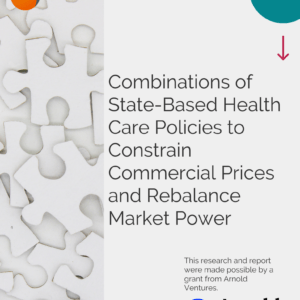Conducting research to stay ahead of the curve
We know it’s hard to track the issues contributing to our current system’s complexity and to figure out where it’s going next.
CPR is here to help by keeping a pulse on what is working and not working in our system through thoughtful, independent research and analysis. Check out our publications and white papers designed to advance our collective thinking on key topics and strategies.
Showing 1–9 of 27 results
-

Combinations of State-Based Health Care Policies to Constrain Commercial Prices and Rebalance Market Power
It’s become painfully apparent that health care doesn’t adhere to the laws of economics, and well-meaning market-based interventions (price transparency, consumer-driven health plans, innovative care delivery models, even provider payment reform) cannot exert enough pressure to right this capsized ship. With this degree of dysfunction, we need a more powerful force to referee the marketplace and level the playing field. We need government intervention – specifically, state government intervention.$0.00Type: White Paper -

Issue Brief #1: The Case for Public Policy Intervention
Market-based interventions have provided insufficient relief from rising commercial health care costs. As a result, states have a unique and pressing opportunity to enact policies that place downward pressure on unit prices and rebalance market power toward health care purchasers and consumers. The geographic, political, and economic diversity across the 50 United States opens possibilities for state governments to shape their own policy agendas; however, states will likely find that a single piece of legislation proves insufficient to deliver meaningful relief, and/or will create vulnerabilities that are easily exploited by stakeholders who benefit from the status quo. Therefore, state legislators may want to consider combinations or menus of policy options to create complementary infrastructure, close loopholes and plan for contingencies.$0.00Type: Action Brief -

Issue Brief #2: Policies to Prevent/Punish Bad Actors
Market-based interventions have provided insufficient relief from rising commercial health care costs. As a result, states have a unique and pressing opportunity to enact policies that place downward pressure on unit prices and rebalance market power toward health care purchasers and consumers. The geographic, political, and economic diversity across the 50 United States opens possibilities for state governments to shape their own policy agendas; however, states will likely find that a single piece of legislation proves insufficient to deliver meaningful relief, and/or will create vulnerabilities that are easily exploited by stakeholders who benefit from the status quo. Therefore, state legislators may want to consider combinations or menus of policy options to create complementary infrastructure, close loopholes and plan for contingencies.$0.00Type: Action Brief -

Issue Brief #3: Shore up Market Against Consolidation and Rising Prices
Market-based interventions have provided insufficient relief from rising commercial health care costs. As a result, states have a unique and pressing opportunity to enact policies that place downward pressure on unit prices and rebalance market power toward health care purchasers and consumers. The geographic, political, and economic diversity across the 50 United States opens possibilities for state governments to shape their own policy agendas; however, states will likely find that a single piece of legislation proves insufficient to deliver meaningful relief, and/or will create vulnerabilities that are easily exploited by stakeholders who benefit from the status quo. Therefore, state legislators may want to consider combinations or menus of policy options to create complementary infrastructure, close loopholes and plan for contingencies.$0.00Type: Action Brief -

Issue Brief #4: Empower Existing Market Balancers
Market-based interventions have provided insufficient relief from rising commercial health care costs. As a result, states have a unique and pressing opportunity to enact policies that place downward pressure on unit prices and rebalance market power toward health care purchasers and consumers. The geographic, political, and economic diversity across the 50 United States opens possibilities for state governments to shape their own policy agendas; however, states will likely find that a single piece of legislation proves insufficient to deliver meaningful relief, and/or will create vulnerabilities that are easily exploited by stakeholders who benefit from the status quo. Therefore, state legislators may want to consider combinations or menus of policy options to create complementary infrastructure, close loopholes and plan for contingencies.$0.00Type: Action Brief -

Issue Brief #5: Regulate Provider Prices
Market-based interventions have provided insufficient relief from rising commercial health care costs. As a result, states have a unique and pressing opportunity to enact policies that place downward pressure on unit prices and rebalance market power toward health care purchasers and consumers. The geographic, political, and economic diversity across the 50 United States opens possibilities for state governments to shape their own policy agendas; however, states will likely find that a single piece of legislation proves insufficient to deliver meaningful relief, and/or will create vulnerabilities that are easily exploited by stakeholders who benefit from the status quo. Therefore, state legislators may want to consider combinations or menus of policy options to create complementary infrastructure, close loopholes and plan for contingencies.$0.00Type: Action Brief -

Issue Brief #6: Pick the Low-Hanging Fruit
Market-based interventions have provided insufficient relief from rising commercial health care costs. As a result, states have a unique and pressing opportunity to enact policies that place downward pressure on unit prices and rebalance market power toward health care purchasers and consumers. The geographic, political, and economic diversity across the 50 United States opens possibilities for state governments to shape their own policy agendas; however, states will likely find that a single piece of legislation proves insufficient to deliver meaningful relief, and/or will create vulnerabilities that are easily exploited by stakeholders who benefit from the status quo. Therefore, state legislators may want to consider combinations or menus of policy options to create complementary infrastructure, close loopholes and plan for contingencies.$0.00Type: Action Brief -

Market-Shaping Enterprises: New Vendors Want to Rescue Health Care
CPR evaluated seven market-shaping enterprises (MSE) vendors and interviewed industry experts to uncover how, why and whether these vendors can reshape the harmful incentives that underpin rising health care costs.$0.00Type: White Paper -

State of Healthcare | Florida
This report, State of Healthcare, sheds light on the key issues facing Florida's healthcare system and outlines three actionable policy solutions aimed at tackling these challenges.$0.00 Download
